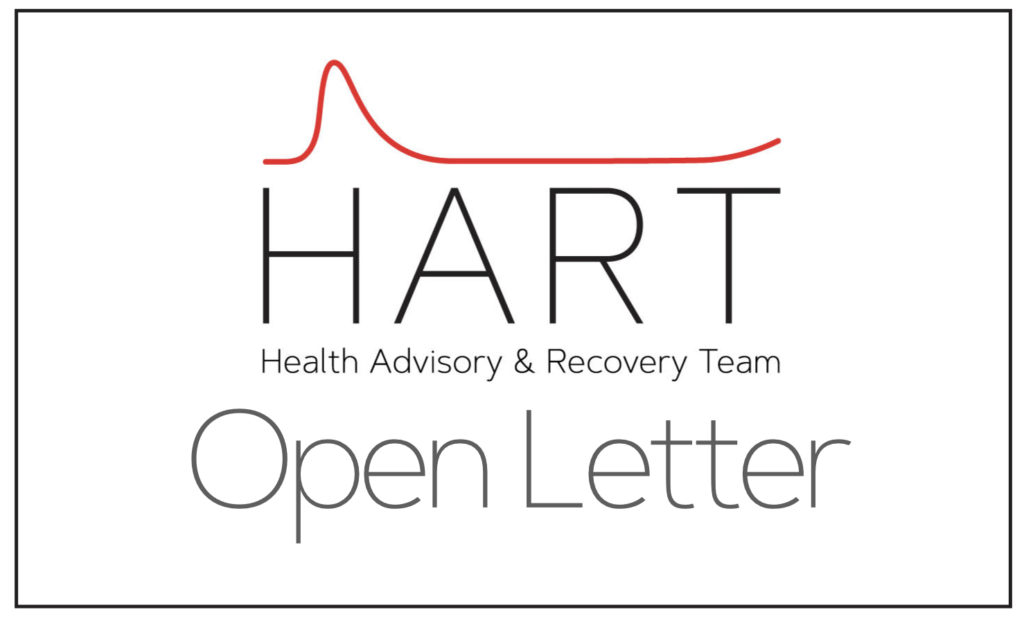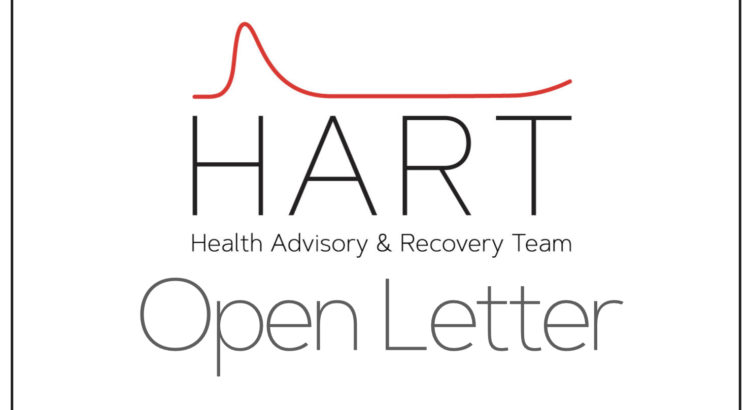
To the Chief Executive of the UKHSA
To: Dr Jenny Harries, Chief Executive, UKHSA
Copies: Dr Andrew Goddard: RCP, Dame Clare Gerada: RCGP, Professor Kevin Fenton: FPH, Dr Jim McManus: ADPH, Dr Camilla Kingdon: RCPCH, Dr Tim Cooksley: Society for Acute Medicine, Dr John Greenwood: British Cardiovascular Soc, Dame Helen Stokes-Lampard: AoMRC
14th August 2022
Dear Dr Harries,
Re: Covid-19-vaccine-associated Myocarditis – A Cumulative Risk
We, the undersigned, are writing to express our deep concern at the guidance regarding further mRNA vaccination after any episode of myocarditis, as detailed in the UKHSA guidance for healthcare professionals.
Myocarditis severity has been downplayed:
The majority of patients with vaccine-associated myocarditis present with chest pain. This may be misinterpreted, by either the patient or doctor, as musculoskeletal pain, which is a recognised non-serious side effect of these products and cardiac pathology could be missed. Any patient presenting with chest pain should be assessed immediately in hospital as this may be life-threatening.
During the covid pandemic, anyone admitted to hospital with a positive test result was considered to have severe Covid-19. With myocarditis, every patient presenting with cardiac symptoms needs hospital assessment including ECGs, blood troponin levels and echocardiograms. This would therefore not fit the definition of a mild illness. A recent BMJ review quotes “Most people were admitted to hospital (≥84%) for a short duration (two to four days).” The review further quotes, “persistent echocardiogram abnormalities, as well as ongoing symptoms or a need for drug treatments or restriction from activities in >50% of patients”. Where cardiac MRI scans have been performed, 89% of patients have shown Late Gadolinium Enhancement (LGE), which is known to be a predictor of a bad prognosis. Inflammation of the heart can lead to fibrosis and other complications such as arrhythmias and death. Left undiagnosed and therefore untreated, there is also a real risk of silent left ventricular dysfunction. Myocarditis should be considered far from being a mild illness.
The long term prognosis for post-vaccination myocarditis is also uncertain but early follow-up studies in children have shown two-thirds had persistent changes on cardiac MRI scans 3-8 months later, despite clinical improvement. A detailed US FDA advisory committee report from late 2021, showed that 40% of affected adolescents were still symptomatic at 3 month follow-up and 50% were still restricting their physical activity. Viral myocarditis can have serious late consequences with an approximately 20% six-year mortality. In the absence of appropriate long-term follow-up, it is reckless to assume that vaccine-associated myocarditis has a milder outcome.
It is therefore concerning that the UKHSA guidance contains advice such as:
- “Where appropriate the patient should be seen face to face and this assessment should include their vital signs.” We would consider a face-to-face assessment essential and feel the phrase “where appropriate” to be misplaced. ““If patients have mild symptoms, they do not require a referral to secondary care at this point.” Again, every patient with chest pain or palpitations should have an urgent ECG and be tested for cardiac troponins. The term mild myocarditis refers to symptoms which resolve and therefore can only be considered a retrospective diagnosis.
- It is impossible to substantiate the statement that “the majority of cases appear to be mild and self-limiting”, whilst acknowledging that “no long-term follow-up data is available yet on hospitalised patients”
Myocarditis incidence has been underplayed: Quoted risk of vaccine-associated myocarditis varies widely, with younger age and male sex being the two biggest risk factors and the vast majority of studies showing a greater risk after a second dose. In Hong Kong, where specific information about myocarditis is given to all vaccinees, 1 in 2680 adolescent boys developed myocarditis after their second dose of Pfizer. A change in policy to a single dosage for this age-group, was estimated to have saved several cases. For boys aged 12-17, post-vaccine-myocarditis exceeds rates of hospitalisation for Covid-19 itself. It is also concerning that there has been no serious attempt to prospectively study the incidence of myocarditis. A study from the US military, found that myocarditis post smallpox vaccination was 200-fold higher than background rates when using diary cards, compared with 7.5 x expected when using routine self-reporting. Blood testing post-vaccination elucidated asymptomatic cases at a further 6-fold higher rate. A small prospective study of secondary school-children in Thailand, using diary cards and blood troponins on day 3 and day 7, showed 29% with a potential cardiac symptom and 18% with abnormal ECGs. This is only a preprint but needs replicating before sweeping assertions of safety can be made.
Cumulative risk:
In most series, myocarditis has occurred after the second dose, yet government guidance suggests patients who have suffered with myocarditis following initial vaccination, may still undergo further vaccinations:
“If there is no evidence of ongoing myocarditis, they can be offered vaccination with the Pfizer (Comirnaty) vaccine from 12 weeks after their last dose if further doses are due. If there is evidence of ongoing effects of acute or subacute myocarditis, then an individual risk benefit assessment should be undertaken”
None of the vaccine trials included patients with a past history of myocarditis and we are aware of no data to support this advice. Giving a Covid-19 vaccine to someone with a past history of myocarditis of any cause, would require a thorough assessment and individual discussion of benefit and risk. Any episode of post-vaccination myocarditis should be seen as an absolute contraindication to receiving any further doses, as the risk of this serious cardiac condition is known to increase after the second dose. The UKHSA has acknowledged the total absence of long-term follow up of vaccine-associated myocarditis. Continuing with the policy outlined above is therefore reckless.
Actions required:
- We ask that you urgently update the advice to ensure that all patients with relevant symptoms are seen face to face and receive at minimum an ECG and a cardiac troponins test, proceeding to Echocardiogram and cardiac MRI if initial investigations support a diagnosis of myocarditis.
- We also urge you to recognise myocarditis is a potentially serious cardiac condition and not refer to it as a mild illness. This is misleading as we do not have long-term safety data to support the use of the word “mild”. Myocarditis has undoubtedly proved fatal for some.
- The guidance should also be corrected to advise that a diagnosis of vaccine-associated myocarditis should be an absolute contraindication to further doses.
- These changes should be notified to all GPs, vaccination centres and emergency medicine departments.
We await a timely reply.
This letter will be published openly, and we hope it is shared widely along with any response.
Yours sincerely
Dr Jonathan Engler, MBChB, LlB (hons), DipPharmMed and
Dr Clare Craig, BMBCh, FRCPath
Co-chairs of HART (Health Advisory & Recovery Team, www.hartgroup.org)
Signatories from HART:
- Dr David Bell, MBBS, PhD, FRCP(UK), Public Health Physician
- Dr Mark A Bell, MBChB, MRCP(UK), FRCEM, Consultant in Emergency Medicine
- Dr Alan Black, MBBS, MSc, DipPharmMed, retired Pharmaceutical Physician
- Dr Emma Brierly, MBBS, MRCGP, General Practitioner
- Dr David Cartland, MBChB, BMedSci, General practitioner
- Dr Peter Chan, BM, MRCS, MRCGP, NLP, General Practitioner, Functional medicine
- Michael Cockayne, MSc, PGDip, SCPHNOH, BA, RN, Occupational Health Practitioner
- James Cook, NHS Registered Nurse, Bachelor of Nursing (Hons), Master of Public Health
- Dr Clare Craig, BM BCh FRCPath, Diagnostic pathologist
- Dr David Critchley, BSc (Hons), PhD, Clinical Pharmacologist
- Dr Jonathan Engler, MBChB, LlB (hons), DipPharmMed
- Dr Elizabeth Evans, MA(Cantab), MBBS, DRCOG, retired Doctor, Director UKMFA
- Dr Ali Haggett, Mental health community work, 3rd sector, former lecturer in the history of medicine
- Mr Anthony Hinton, MBChB, FRCS, Consultant ENT surgeon, London
- Dr Keith Johnson, BA, DPhil (Oxon), IP Consultant for Diagnostic Testing
- Dr Rosamond Jones, MBBS, MD, FRCPCH, retired consultant paediatrician, convener CCVAC
- Dr Tanya Klymenko, PhD, FHEA, FIBMS, Senior Lecturer in Biomedical Sciences
- Dr Branko Latinkic, BSc, PhD, Molecular Biologist
- Dr John Flack, BPharm, PhD, retired Director of Safety Evaluation at Beecham Pharmaceuticals, retired Senior Vice-president for Drug Discovery SmithKline Beecham
- Dr Ayiesha Malik, MBChB, General Practitioner
- Mr Ian McDermott, MBBS, MS, FRCS(Tr&Orth), FFSEM(UK), Consultant Orthopaedic Surgeon
- Dr Franziska Meuschel, MD, ND, PhD, LFHom, BSEM, Nutritional, Environmental and Integrated Medicine
- Dr Alan Mordue, MBChB, FFPH. Retired Consultant in Public Health Medicine & Epidemiology
- Dr Rachel Nicholl, PhD, Medical researcher
- Rev Dr William J U Philip MB ChB, MRCP, BD, Senior Minister The Tron Church, Glasgow, formerly physician specialising in cardiology
- Dr Jon Rogers, MB ChB (Bristol), Retired General Practitioner
- Mr James Royle, MBChB, FRCS, MMedEd, Colorectal surgeon
- Dr Roland Salmon, MB BS, MRCGP, FFPH, Former Director, Communicable Disease Surveillance Centre Wales
- Natalie Stephenson, BSc (Hons) Paediatric Audiologist
- Dr Zenobia Storah,MA (Oxon), Dip Psych, DClinPsy, Senior Clinical Psychologist (Child and Adolescent)
- Dr Helen Westwood MBChB MRCGP DCH DRCOG, General Practitioner
- Mr Lasantha Wijesinghe, FRCS, Consultant Vascular Surgeon
Further signatories
- Julie Annakin, RN, Immunisation Specialist Nurse
- Dr Michael Bazlinton, MBCHB, MRCGP, DCH, General Practitioner
- Dr Michael D Bell, MBChB, MRCGP, retired General Practitioner
- Mr John Bunni, MBChB (Hons), Dip Lap Surg, FRCS [ASGBI Medal] – Consultant Colorectal and General Surgeon
- Dr Elizabeth Burton, MB ChB, retired General Practitioner
- Professor Angus Dalgleish, MD, FRCP, FRACP, FRCPath, FMed Sci, Principal, Institute for Cancer Vaccines & Immunotherapy (ICVI)
- Dr Christopher Exley, PhD FRSB, retired professor in Bioinorganic Chemistry
- Professor John Fairclough, FRCS FFSEM, retired Honorary Consultant Surgeon
- Dr Jenny Goodman, MA, MBChB, Ecological Medicine
- Dr Catherine Hatton, MBChB, General Practitioner
- Dr Renée Hoenderkampf, General Practitioner
- Dr Charles Lane, MA, DPhil, Molecular Biologist
- Dr Felicity Lillingston, IMD DHS PhD ANP, Doctor, Urgent Care, Research Fellow
- Professor David Livermore, BSc, PhD, retired Professor of Medical Microbiology
- Katherine MacGilchrist, BSc (Hons), MSc, CEO/Systematic Review Director, Epidemica Ltd.
- Dr Geoffrey Maidment, MBBS, MD, FRCP, Consultant physician, retired
- Dr Kulvinder Singh Manik, MBBS, General Practitioner
- Dr Fiona Martindale, MBChB, MRCGP, General Practitioner
- Dr S McBride, BSc(Hons) Medical Microbiology & Immunobiology, MBBCh BAO, MSc in Clinical Gerontology, MRCP(UK), FRCEM, FRCP(Edinburgh). NHS Emergency Medicine & geriatrics
- Professor Dennis McGonagle, PhD, FRCPI, Professor of Investigative Rheumatology, University of Leeds
- Dr Scott Mitchell, MBChB, MRCS, Emergency Medicine Physician
- Dr David Morris, MBChB, MRCP(UK), General Practitioner
- Dr Greta Mushet, MBChB, MRCPsych, retired Consultant Psychiatrist in Psychotherapy
- Dr Sarah Myhill, MBBS, retired GP and Naturopathic Physician
- Dr Christina Peers, MBBS, DRCOG, DFSRH, FFSRH, Menopause specialist
- Anna Phillips, RSCN, BSc Hons, Clinical Lead Trainer Clinical Systems (Paediatric Intensive Care)
- Dr Angharad Powell, MBChB, BSc (hons), DFRSH, DCP (Ireland), DRCOG, DipOccMed, MRCGP, General Practitioner
- Dr Salmaan Saleem, MBBS, BmedSci, MRCGP General Practitioner
- Dr Rohaan Seth, Bsc, MBChB, MRCGP, Retired General Practitioner
- Dr Noel Thomas, MA, MBChB, DCH, DObsRCOG, DTM&H, MFHom, retired doctor
- Dr Stephen Ting, MB CHB, MRCP, PhD, Consultant Physician
- Dr Livia Tossici-Bolt, PhD, Clinical Scientist
- Dr Carmen Wheatley, DPhil, Orthomolecular Oncology
- Dr Ruth Wilde, MB BCh, MRCEM, AFMCP, Integrative & Functional Medicine Doctor
- Dr Lucie Wilk, MD, Consultant Rheumatologist
- Dr Stefanie Williams, MD, Dermatologist

